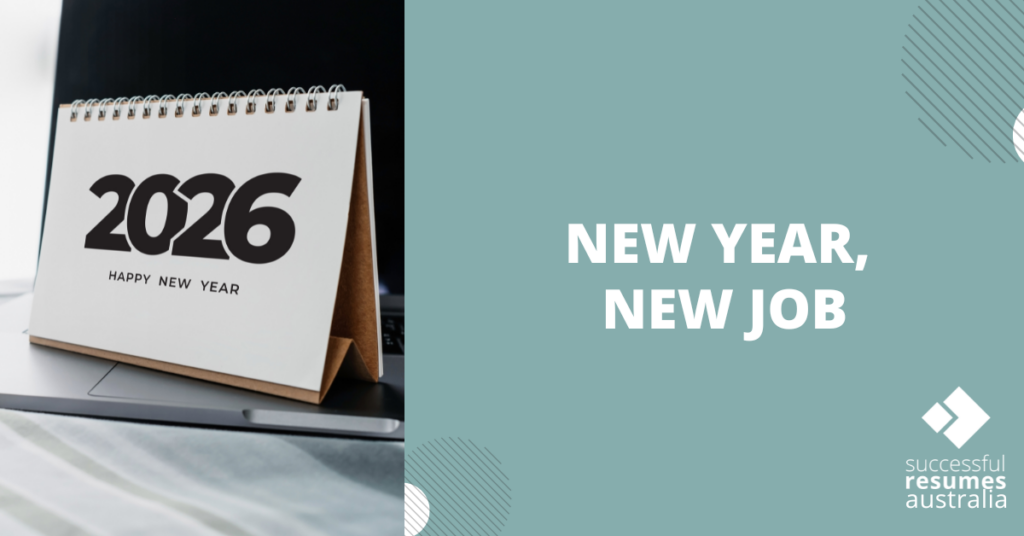New Year, New Job: Why January Job Searches Stall

New Year, New Job Why January Job Searches Stall (and What Actually Works in Australia) January has a particular energy. It’s the month of fresh notebooks, bold intentions and 47 open job tabs you swear you’ll “apply to tonight.” You update your resume.You refresh LinkedIn.You apply for a few roles that are “close enough.”You tell yourself you’re being proactive. And then… nothing happens. If this sounds familiar, you’re not failing. You’re responding to January the way most people do and January rewards a very specific kind of behaviour. January Is a High-Competition Month in Australia In Australia, job search activity spikes sharply at the start of the year. More people are searching. More people are applying. But the number of genuinely suitable roles doesn’t double overnight. SEEK’s seasonality data consistently shows: Job search activity peaks in January Unemployment often rises in January Employment growth tends to lift in February as hiring decisions flow through In other words, competition increases faster than opportunity. So if January feels crowded, it’s because it is. The most common response to this pressure looks like productivity, but rarely delivers results: more applications broader targeting longer cover letters more explaining This is the January trap: high effort, low traction. Why January Job Searches Stall January job searches don’t stall because people lack motivation. They stall because most candidates don’t have a visibility problem—they have a credibility problem. Not actual credibility.Perceived credibility in the eyes of hiring managers. Hiring is a risk decision. And in a crowded market, enthusiasm doesn’t reduce risk—clarity does. The fastest way to stand out in January is to stop doing what most candidates do. Stop Presenting Multiple Professional Identities at Once If your resume or LinkedIn profile sounds like this: “I can do operations, project management, customer success, and HR…” “Open to anything, really…” “Happy to consider senior or mid-level roles…” You’re not showing flexibility.You’re signalling uncertainty. Australian recruiters move quickly—especially early in the year. When they can’t immediately see what you are, they move on. Pick one lane long enough to build momentum: one role family one level one clear direction Not forever. Just long enough for your resume to tell one coherent story, not several competing ones. This matters more in Australia than many candidates realise, given the high volume of job movement early in the year. Why Signal Quality Matters More Than Ever According to the Australian Bureau of Statistics, 1.1 million Australians changed jobs in the year ending February 2025. That level of movement means: recruiters triage harder “maybe” candidates are filtered faster resumes must do more work upfront In a noisy market, your resume can’t afford to be vague. This is where professional resume writers in Australia make a measurable difference—by tightening signal quality, not adding noise. The “New Job” Strategy That Actually Works in January Don’t try to out-apply the market. Out-position it. Here’s what that looks like when you’re serious—but not frantic. Step 1: Decide What You’re Being Hired As Not your past title.Not your full career history. What role should someone assume you’re right for after a 12-second scan? Write it as a single line: “I’m targeting ___ roles, at ___ level, in ___ environments.” If you can’t finish that sentence, January will happily consume your time without results. Step 2: Replace Responsibilities With Proof In January, most resumes read like job descriptions. Hiring managers don’t hire responsibilities.They hire outcomes. Instead of: “Managed stakeholders” “Led projects” “Responsible for operations” Use proof that reduces doubt: what changed because you were there the scale you operated at what you improved, delivered, reduced, or protected the constraints you worked under Example:“Managed stakeholders” becomes:“Aligned operations, finance and customer teams to deliver X outcome under Y constraint, reducing delays by Z.” If your bullet points could belong to anyone, they will. This is a core principle of ATS-friendly resumes in Australia—specific, measurable, role-aligned evidence. Step 3: Use Employer Logic, Not Candidate Logic Most people write resumes like this: “Here’s everything I’ve done.” Strong candidates write: “Here’s why I’m safe to hire for this role.” Australian employer research consistently shows hiring managers filter for: job-ready capability reduced onboarding risk evidence of operating at level clear contextual fit Your resume and LinkedIn profile must make those signals easy to spot—quickly. This is where professional resume writing services in Australia focus their value. Step 4: Let Demand Guide Direction If you’re unsure where to aim, don’t guess—use data. Two reliable Australian indicators: Job vacancies by industry (overall demand) Online job ad trends by role and region (direction of movement) You don’t need to become an economist. You just need to avoid targeting a shrinking corner of the market with a generic message. January Rewards Calm, Clear Candidates The most successful January job seekers aren’t frantic. They: pick a lane early tighten their message apply to fewer, better-matched roles communicate with confidence, not urgency They treat the year like this:January is for positioning. February is for conversion. That pattern aligns closely with SEEK’s observed hiring cycles across Australia. A Practical Two-Week Reset (No Hustle Theatre) Days 1–3: Pick the lane role family + level + target environment review 5 real job ads and highlight repeated language Days 4–7: Rebuild your resume headline aligned to the target role 3–5 proof-based bullets push older or less relevant detail down Days 8–10: Align LinkedIn headline mirrors resume positioning About section reflects the same proof points experience reinforces one clear narrative Days 11–14: Apply with intent fewer applications, stronger alignment one short outreach per role: “Here’s the value I bring in your context” That’s it. If You Remember One Thing January job searching isn’t hard because you lack motivation. It’s hard because crowded markets punish vague positioning. Trying to be everything to everyone rarely works. Be obvious. Thinking “New Year, New Job” This Year? If January feels busy but unproductive, it’s rarely because you’re doing nothing. It’s usually because your resume and LinkedIn profile aren’t sending a clear enough signal in a competitive Australian job market.
The Resume AI Trap: Why ChatGPT and Copilot Can Quietly Cost You Interviews

The Resume AI Trap: Why ChatGPT and Copilot Can Quietly Cost You Interviews Can recruiters tell when a resume is written by AI? Let’s say you did what everyone’s doing. You opened ChatGPT or Copilot. You pasted your job history. You added the job ad. You asked for a “professional, ATS-friendly resume”. And the output looked… good. Clean. Confident. Polished. So why does it still feel like your applications are vanishing into thin air? Because a resume isn’t judged the way an English essay is judged. It’s judged like a risk document. Hiring managers aren’t asking, “Is this written nicely?”They’re asking, “Do I believe this person can do the job, and do I trust what I’m reading?” And right now, AI-written resumes are triggering a very specific reaction in hiring teams: “This looks… fine. But I don’t feel the person.” Recruiters have even published guidance on how they spot AI resumes, and generic language without substance is one of the biggest giveaways. This article isn’t “anti-AI”. We use tools thoughtfully at Successful Resumes. But letting AI author your resume from scratch is where people get hurt, not dramatically, not obviously, just… quietly, consistently, through fewer callbacks. After reviewing thousands of resumes across industries at Successful Resumes, we see the same pattern repeat: AI-written resumes look competent on the surface but quietly erode trust where it matters most. Here’s why. AI makes you sound employable… in the most forgettable way AI is brilliant at producing “professional” sentences that could apply to almost anyone. That’s the problem. Recruiters are seeing waves of resumes full of the same smooth, interchangeable phrasing, and when everyone sounds the same, nobody stands out. Recruiters themselves say generic, “all the right words” language is a common AI tell. A human resume that gets interviews usually has something AI struggles to generate: a specific scope a clear “before/after” result a credible level of detail the right weight in the right places AI will happily tell an employer you’re “results-driven”.A strong resume shows what changed because you were there. This is where AI often hurts strong candidates more than weak ones. It smooths away exactly what made them credible in the first place. The resume starts mirroring the job ad (and that can backfire) Most people prompt AI like this: “Use the job description and tailor my resume.” So AI does what it does best: it mirrors language. The risk is you end up with a resume that reads like a rehash of the job ad, keyword-heavy, light on proof. That doesn’t feel tailored. It feels manufactured. And manufactured is the opposite of trust. (Yes, keywords matter. But “keywords without evidence” is where applications die.) AI can accidentally invent things, and you won’t always notice AI tools can “fill gaps” when your input is incomplete, vague, or messy. In normal writing, that’s helpful. In resumes, it’s dangerous. It might: inflate your seniority (“led”, “owned”, “directed”) broaden your responsibilities smooth over dates or scope imply certifications you don’t have Even small inaccuracies create big interview problems. Not because someone is trying to trick you, but because the resume is now presenting a version of you that you can’t comfortably defend under pressure. And interviewers notice that mismatch quickly. ATS “optimisation” is more than keyword stuffing A lot of candidates believe AI = ATS safe. Sometimes it is. Often it isn’t. Two big reasons: Formatting and readability If you use AI tools plus templates that lean on columns, tables, text boxes, or fancy layouts, many ATS platforms struggle to read them properly, content can be scrambled or dropped altogether. So you may think you applied with a strong resume, but the employer’s system captured an incomplete, mangled version. Structure and section logic AI often produces resumes that look tidy but don’t follow the most effective hierarchy for screening: the sections recruiters scan first, the order that sells your fit fastest, the balance between scope and outcomes. ATS isn’t just a gate. It’s the first layer of a human hiring workflow. Recruiters can spot AI writing, and many don’t like it This is the part job seekers underestimate. It’s not that using AI is “cheating”. It’s that AI writing has a smell, patterns, rhythm, buzzwords, polished emptiness. And once a recruiter suspects it, a question appears: “If they didn’t write this, then what else don’t I know about them?” One widely reported survey result that did the rounds in career media: a large proportion of hiring managers say they dislike AI-generated applications and believe they can identify them. Even when employers don’t formally ban AI, the perception can still cost you. Your resume might not match your real voice, and that creates a “trust gap” Here’s a reality we see all the time: AI resume = polished, corporate, extremely “together” Candidate = normal human who speaks plainly Then the interview happens. And the hiring manager experiences a gap between the document and the person. Not a skills gap, a credibility gap. The resume reads confident and senior. The candidate is thoughtful and capable, just more measured. The gap isn’t dramatic, but it’s enough to introduce doubt. That gap makes hiring feel riskier. A great resume isn’t the fanciest version of you.It’s the truest professional version of you, the one you can naturally back up in conversation. Privacy: you’re feeding highly personal data into systems you don’t control Resumes contain sensitive information: employment history, locations, contact details, sometimes salary, sometimes visa status, sometimes health gaps you’re trying to explain carefully. When you paste that into a generative AI tool, you may be creating privacy and security risks you didn’t intend, and privacy experts have warned that the AI boom introduces new privacy challenges around personal data. Even major institutions and firms advise caution with what you enter into AI tools, because conversational interfaces encourage oversharing. At minimum: if you use AI, anonymise names, companies, and identifying details. The job market is adapting, and “AI applications” are changing hiring processes As AI-generated applications
Mining Industry Resume

Resume Writing for the Mining Industry: What You Need to Stand Out Why the Mining Sector Needs More Than a Standard Resume Australia’s mining industry is one of the largest and most competitive job markets in the country. From FIFO operators and tradies to engineers and safety advisors, mining professionals face unique demands — and recruiters want to see that you get it from the first glance at your resume. A general resume simply won’t cut it. Whether you’re applying for a site-based role, a supervisory position, or head office support, your resume needs to be: Compliant with industry standards Optimised for mining-specific applicant tracking systems (ATS) Clear, skills-focused, and tailored to the role That’s where we come in. What Mining Employers Are Looking For Recruiters in the mining and resources sector are often scanning hundreds of applications per role. Here’s what they prioritise: – Safety Culture Demonstrated understanding of safety protocols, risk assessments, and compliance with WHS legislation is essential. – Site Readiness Employers want to know you’re ready to hit the ground running — with current tickets, inductions, and experience in similar environments. – FIFO/Roster Fit Clearly stating your ability to work a FIFO or DIDO roster shows you’re prepared for the physical and mental demands of remote work. – Qualifications & Tickets Make sure all your relevant certifications are up to date and easy to spot: Confined Space Entry Working at Heights Standard 11 HR/MC Licence Cert III/IV in relevant trades White Card, MSIC, Gas Test, etc. Common Mistakes in Mining Resumes At Successful Resumes, we see a lot of well-meaning but ineffective mining resumes. Here are the most common problems: – Too Much Jargon Listing every machine, tool, or ticket without showing how you used them or the value you delivered. – No Tailoring Using the same resume for every job, even when the scope of work or company type is completely different. – Missing Context Not explaining the size of the project/site, team, or roster you worked on helps employers gauge your experience level. What We Include in a Strong Mining Resume We write each resume with a clear structure, industry keywords, and a focus on achievements, not just duties. Here’s what a well-structured mining resume includes: Professional Summary: Who you are, what you bring, and your goals Key Skills: Including soft skills (communication, safety focus) and technical abilities Licences & Tickets: Highlighted in a separate section Project or Site Experience: Specifics on equipment used, type of work, roster, and site location Achievements: Safety milestones, productivity improvements, leadership examples References: Optional but helpful, especially for site-based roles FIFO & Mining Resumes We Commonly Write Our writers have experience supporting: Mobile Plant Operators HD Fitters / Boilermakers Electricians & Instrument Techs Safety Advisors / HSE Coordinators Mining Engineers Admin, Procurement, and Camp Support Environmental Officers Project Managers & Supervisors Whether you’re on a Tier 1 site in the Pilbara or looking to break into the industry, we’ll match your resume to your goals. Let’s Get You Job-Ready With resume writers based in Perth, Brisbane, Sydney and across Australia, we understand the regional and site-specific needs of the mining sector. Need help getting shortlisted for a mining job?Book a consultation or talk to one of our resume writers today — and let’s build a resume that works as hard as you do.
Why Choose a Professional Resume Writer Over AI

Why Choose a Professional Resume Writer Over AI When it comes to your career, your resume is one of the most important documents you’ll ever create. In today’s digital world, you might be wondering: “Why pay for a professional resume writer when I can just use AI for free?” It’s a fair question, but when it comes to real results, there’s simply no substitute for personalised, human-written career documents. Here’s why working with a professional resume writer at Successful Resumes will always outshine a quick AI-generated template. AI Can Sound Good, But It Doesn’t Truly Know You Artificial intelligence tools can string together sentences and mimic the tone of a resume. But they don’t know your story, your achievements, or what sets you apart from hundreds of other applicants. A generic, AI-generated resume might look polished, but it often lacks the substance that hiring managers are really looking for. At Successful Resumes, we take the time to get to know you — your strengths, career goals, and what makes your experience valuable. Then we craft a tailored resume that reflects you, not just a job description. Your Resume Needs to Be ATS-Friendly, And AI Doesn’t Always Get It Right Most companies now use Applicant Tracking Systems (ATS) to scan resumes before a human even sees them. These systems rely on formatting, structure, and keywords to rank your application. AI-generated resumes often miss the mark when it comes to ATS optimisation. They might use flashy formatting that gets rejected or lack the specific keywords required to pass through the system. We’re experts in ATS-compliant resume writing. We know how to structure and format your resume so it not only gets noticed, but gets you through to the next round. We Write for Humans, Not Just Algorithms AI can’t replicate human nuance. It doesn’t understand how to communicate your achievements in a way that feels authentic, confident, and compelling to a recruiter. At Successful Resumes, we focus on more than just ticking boxes. We write with purpose, using language that speaks to real people who are reviewing applications and making hiring decisions. Whether you’re applying for a leadership role, a FIFO position, or a graduate job, our resumes are designed to stand out, for all the right reasons. Every Resume Is Written By an Experienced Australian Writer Unlike AI, we don’t take shortcuts. Every resume we produce is written by a local, experienced writer who understands the Australian job market, recruitment trends, and industry-specific language. We don’t use templates. We don’t outsource overseas. You get personalised service, local insights, and a resume that’s truly unique to you. Career Support That Goes Beyond the Page When you work with us, you’re not just getting a resume — you’re getting a partner in your career journey. We offer tailored advice, help you articulate your achievements, and give you the confidence to apply for the roles you deserve. Our services include: Resume writing for all industries and career levels Cover letters and selection criteria responses LinkedIn profile writing Government job applications Interview skills training We’ve helped thousands of Australians get hired, and we’d love to help you too. Invest In Your Future, Not a Quick Fix AI tools are convenient. But when it comes to landing your next job or career move, you can’t afford to leave it to chance. A professionally written resume is an investment in your future, and it can make the difference between getting overlooked or getting the interview. Let’s tell your story the right way. Ready to get started? Contact your local Successful Resumes writer today and take the next step with confidence.
How Do Marketers Market Themselves?

Many people think of the interview process like selling, but they often pay little attention to the document that, ultimately, can get them the interview. How do you sell to the people who know all the tricks? Understanding how to present your skills and experience in a way that helps you attract the attention of potential employers is critical to succeeding in any job application. It’s even more critical when stepping into a marketing role where knowing what separates a good sales pitch from a bad one is a core job requirement. Fortunately, if you have experience in the marketing and communication space, you should already have the skills necessary to craft an application that demands attention, it simply takes a fresh approach. We sat down with Successful Resume’s marketing expert Neale Gallagher to find out a bit more. A change in mindset In some industries, it’s enough to treat your application like a written record of your career to date. Not so in marketing. While recruiters and employers will want you to demonstrate competencies and show past experience and achievements, marketing resumes need to reflect your contribution to the business bottom line. Essentially, justifying why you were employed and the value you added. Neale said it can be helpful to approach your whole application package – resume, cover letter, and interview – like you would a marketing campaign with a known and specific audience. “Think target marketing. Just focus your application on what has been requested in the job advertisement or job specification; the opportunity to expand and sell your skills will come at the time of the interview,“ he said. “For now, the role of the resume is to get the candidate to the interview.” Honing your approach Neale suggested that marketers look to the 4Ps – product, price, promotion, and place – to shape their written material. How and where have you prepared a pricing strategy and using what techniques, and how did this influence sales volume? Do you understand the audience you’re speaking to and the language that suits them? Are you able to show that your skills align to the needs of the job? Can you stand out from the crowd with evidence, such as increasing sales by a certain percentage or establishing new sales channels? These are questions you should focus sharply on in your resume and cover letter. “Of course, a key element of any promotional activity is the message” Neale said. “The same applies to resume writing. What message is most suitable for this specific application? Take the time to consider your achievements and contributions carefully – this can help you capture the attention of the employer. Make sure that these achievements align with the needs of the organisation.” If you would like to speak to Neale yourself to find out how you could open doors in your marketing career, contact him today on 0417 255 048 or send him an email at neale@successfulresumes.com.au.
The Future of Australia’s Miners

With the Australian mining industry in a slump and mines across the country closing, many employees are looking for new jobs. But with the whole industry experiencing a slow-down, finding employment in a similar role nearby is increasingly difficult. In this blog, we’ll discuss where miners can go with the skills they already have, and how they can best market themselves in a post-boom Australia. Finding the next opportunity As mines across Australia close and once cash-rich mining companies such as Peabody Australia lose billions against falling commodities prices, the pool of available mining jobs has become smaller and smaller. While the industry has recovered from the lows of the early 2010s, it has not reached the stratospheric highs of the late 2000s, leaving many highly talented and experienced mining engineers out of work. Fortunately, there are sectors of the industry that are growing instead of shrinking, offering great opportunities for savvy applicants. The industry as a whole has seen a boom in the number of jobs offered with a focus in Western Australia. In a 12-month period, the number of job advertisements has climbed by nearly 90 per cent, leading some commenters to suggest the slump is ending. This is supported by figures from DFP Recruitment, arguing that employment prospects across the national industry have improved by 35 per cent between June 2016 and June 2017. Additionally, industry watchers are forecasting an explosion in the number of jobs in jobs attached to the mining of tech metals. This sector deals in materials used in the construction of everything from batteries to mobile devices to solar panels – demand for which is only increasing. Australia is extremely rich in many rare earth metals, leading many to predict a domestic boom on both raw and processed materials. How to sell yourself Despite rosy projects for the mining industry, applicants still need to be aware that securing the right role requires careful attention to how you frame and present your experience and skill-set. With the number of skilled workers in Australia ever increasing, competition is strong. Showing how you’re able to add value to the company is more important than ever. The first step to any successful resume is to build your career narrative. Remove the out-dated objective statement and start your document with a summary of your value. It’s important to help the reader quickly understand your experience, skills and abilities and how they would benefit the team and company. When companies are hiring what they are looking for are people who can help them achieve their goals. To make your resume stand out, you can’t just tell them you are capable of doing the job you have to demonstrate your capability. Through our consultation process, we learn about our client’s experience, accomplishments, skills and qualifications or certifications to build a career narrative that demonstrates the client’s capability and value. To learn how to translate your experience, skills and qualifications or certifications into an eye-catching and persuasive resume, speak to Successful Resumes today. We have a specialised team of writers who have extensive experience supporting clients with their careers in the mining, engineering or oil & gas industry, so you can rest assured you’re in expert hands when you work with us. Contact us for more information.
The Changing Face Of News

The Australian news industry is going through a period of significant transformation. With News Corporation losing more than $800 million across its Australian and UK newspapers and Fairfax axing 125 jobs across its metropolitan dailies, the writing is on the wall. Since the global decline in newspapers began in earnest in the late 2000s, commentators have repeatedly asked what will happen to journalists who have been made redundant. As publications of all sizes from national dailies to regional weeklies struggle to find the necessary cash to finance their operations, many journalists are preparing for life outside the industry. To find out more about the range of options open to former journalists, we spoke to Dee Bendo from Successful Resumes. Shifting down and sideways While the industry is in decline, Dee highlight that this doesn’t mean that job vacancies have fallen to zero. Journalists can no longer count on there always being generalist positions at larger publications. Competition at smaller publications has become fiercer, as the sprawling newsrooms of metropolitan daily newspapers such as The Australian, The Age and The Daily Telegraph face the axe. “Many journalists are taking significant pay cuts to work at smaller, more niche or online-only publications in order to stay in the industry whilst hoping another opportunity with a major metro newspaper will become available,” she said. For those journalists hoping to re-enter the industry at a high level, Dee stressed the importance of a spotless, attention-grabbing application and portfolio. “You need a real point of differentiation and a lot of wow factor in your career passport in order to compete in the industry. “Your resume and social media profiles need to scream for attention with uniqueness,” Dee said. “Make a real value proposition to potential employers.” Closing a door and opening a window Some former journalists are opting not to battle onwards in a declining industry and are taking their unique skillsets elsewhere in the communications sector. Dee said that while the newspaper industry is going through a transitional period, journalistic virtues like attention to detail, networking ability, strong interpersonal skills, and a high level of general knowledge can help them secure work elsewhere. “Clients I have worked with have applied for Senior Communication Strategist, Content Advisors or something like PR and Social Media focused roles,” she said. “Others felt they were too old to fight the market and secured government based roles with less responsibility.” She had seen clients go on to included rewarding careers in international not-for-profits, community development organisations, educational institutions and more. For those who are considering leaving the industry, Dee offered some consoling words. “For many of my clients, redundancy was the best thing that’s ever happened to them because it has led many of them to a new world of success, work-life balance and job satisfaction,” she said. “Some earn way more than they used to as highly successful journalists.”
9 Professional Tips to Nailing Your Resume

Have you sent out endless resumes but still haven’t gotten called into an interview? Here are nine tips on how to nail your resume and get your foot in the door. The very first thing to remember when writing a resume is to take your time and not just throw something together. A clean, organised and well-written resume is your key to unlocking opportunities with potential employers. Did you know your resume has only 6 seconds? After a job is advertised, hiring managers may have to sift through hundreds of resumes. This initial stage can be broken into two outcomes: selection and rejection. Research tells us that on average, hiring managers spend six seconds to decide which pile your resume lands in. To give yourself the best chance of being selected, the first step is not to give them a reason to dismiss your resume on the first pass. Nine simple steps to creating an approved resume Want some more tips? Check out our full post at JobGetter and begin that job search right away! When in doubt, speak to professionals. Successful Resumes has more than 30 writers across Australia who support jobseekers with a resume that helps them shine. Get in touch with writers in New South Wales, Canberra, Victoria, Queensland, Western Australia and South Australia.
Applying for jobs in the Australian Government – the Selection Process

If a role within the Australian government sounds like something you are interested in, then a job with the Australian Public Service (APS) is where you should start looking. The APS is Australia’s federal public service. There are currently 18 Departments and dozens of Agencies. Each of these organisations develops and administer policy and services for sectors. These sectors include defence, finance, environment, education, health, community services, workplace relations, immigration, science, tourism, transport and more. Applying for roles within the APS may seem daunting but our Canberra expert Jenny Carlin says with the right preparation, it’s not as hard as you think. Jenny has been supporting jobseekers write public sector applications for more than 20 years. We asked Jenny to give us her top tips on how to write an application that will get an interview. Understand Public Sector application requirements“It’s important to understand the role beyond the position description” says Jenny. “Before you jump into your application, speak to the Contact Officer. They provide more insight into the expectations and requirements of the role than the position description. This is particularly helpful if you are trying to decide if it is the right job for you or if you have the skills they are looking for.” Understand the application requirements. “Most APS roles will include an application kit that will tell you exactly what to submit with your application. Read this carefully to understand exactly what the employer wants. Make sure you are clear about the structure and length, how to submit the application, the preferred resume format and length, and the closing date”. “Once you’ve decided the position is a good fit for you and you know the application requirements, research the context of the role, and where the level sits within the ILS (Integrated Leadership System) – the APS competency framework. Knowing the competencies that the APS expect at each level will help you choose jobs, tailor your application and decide on examples of your experience at the appropriate level”. What are selection criteria?“Most of the time, your Resume or CV alone won’t be enough to get you an APS job. When applying for positions in the Public Service it’s expected that you will be asked to address selection criteria” explains Jenny. Selection criteria describe the personal qualities, skills, knowledge and qualifications (if any) you need to do the job successfully. They provide a consistent and broad tool to assess candidates against the position requirements. This helps selection panels find the right person for the role. The way you answer selection criteria will have a significant impact on how the selection team see your competencies compared to what they are looking for, and whether they shortlist you for an interview or not. Addressing selection criteriaOnce you have the application kit and know whether you have to write a great cover letter to complement a superb resume, you’re ready to start addressing the selection criteria. It is important to respond to each criterion. Applications are based on merit, so if you leave any criteria responses out, it is likely your applications will be disregarded. To respond to criteria, write one to two paragraphs that explain how you have demonstrated the particular skill or quality they require. Make sure you provide relevant examples from your work, study or community roles. “Make it relevant, succinct, and factual. Be specific with your evidence and steer away from broad, general statements about what you have done” advises Jenny. “Focus on outcomes and where possible highlight how successful you were in achieving the expectations of your previous roles. Focus on the competencies you used to make things happen.” Writing pitch statements for government rolesMore and more, agencies are asking candidates to prepare pitch statements that outline their suitability for the role. Often these statements are set to 1 or 2 pages or a limited number of words. However, regardless of whether the agency wants a ‘pitch’ or a response to a set number of criteria, the content (i.e. the examples of your work) will be similar. When writing your pitch, the first step is to create a structure. Structures help you present information in a way that makes it easy for readers understand how your skills fit the role. Structures also help keep you on track which is important with set word limits. Choose examples that showcase how you have the experience to do the role and why you are the best candidate. You can use a formula to present each example. There are many out there including: STAR: Situation, Task, Action ResultCAR: Circumstance, Action, ResultSAR: Situation, Action, ResultSAO: Situation, Action, Outcome.Regardless of your formula, identify a situation or challenge that you were presented with. Then detail what steps you took or what changes you made, to fix or improve the situation. Lastly, describe the outcomes or results that happened as a result of your actions. “The written application itself shows how well you communicate, but it also provides insight into other skills. If there is a word or page limit, make sure you stick to it. Lastly, don’t forget to edit your responses for grammar, spelling and punctuation!” How to startAre you ready for a career in the Australian public service? Look for position advertisements online at the APS Employment Gazette (the official journal that lists all appointments and vacancies in the APS, on agency websites (Find a list of agencies at www.australia.gov.au/directories/government-sites-by-portfolio), and on websites such as www.jobsearch.gov.au. For support writing selection criteria, resumes, CV’s or pitch statements, contact us below for a no obligation chat. Contact Form
Public Vs Private Sector – what’s a better fit for you?

A popular question from of our clients is the relative merits of roles in the private or public sector … Although there are great opportunities across both sectors they are different in flavour. Culture, practices, and regulations can differ significantly between the sectors so each will suit some people but not others. To help you make a smarter choice for your next job application, Successful Resumes has put together this short comparison to help illustrate the differences and similarities between the two. The Australian public sector includes local state and federal government agencies and departments funded by the taxpayer. Collectively they employ more people than any single private sector business in Australia. So is a job in the Australian public service for you?Security and GrowthThe public sector has a long tradition of being a high-security and growth sector. The Australian columnist Bernard Salt recently reported that “between the 2006 and 2016 censuses Australia’s population increased by 18 percent, as did the Australian workforce”. During this time, the public-sector workforce rose by 23% whereas the private sector rose by 16% to 8.932 million. He goes on to say that the “public sector is expanding faster than the rate of population growth and faster than the rate of job growth in the private sector.” This said the public service has been accused of being too slow to take up new innovations and technologies. Individuals looking for a more agile workplace should consider trading job security for dynamism and find their home in smaller, private enterprises. MoneyFor the majority of roles, you’re likely to see more money in the private sector. Although Australian public sector salaries can be competitive, they are not able to compete when it comes to bonuses or the potential long-term reward of employee share schemes. Salary increases are, on average, slower and more structured in the public service than in the private sector. If paid, bonuses are capped and often represent a small percentage of your salary. In stark contrast, bonuses in the private sector can well exceed your salary. If you equate money to time, however, your decent salary in the private sector can dwindle. When you consider that private sector roles typically expect longer working hours, the dollar per hour of time can improve the appeal of the public sector. Especially if work-life balance is important to you. Work/life balanceWhen it comes to the elusive work/life balance, you’re probably going to get closer to this mythical lifestyle in the public sector. Typically employment awards and agreements preserve shorter working hours. Overtime can often also be accrued and paid back in flexible leave. When you combine this with generous leave entitlements, you’re more likely to enjoy life outside of work in the public sector. Flexibility at workThe public sector has traditionally held the banner for flexible working environments due to their shorter working weeks (most commonly 35-40 hours). But with flexible workplaces proving key to employee retention, many private sector companies are adopting flexible working environments and are possibly doing it better. With less bureaucracy than the public sector, some private companies are positioning themselves as an employer of choice by through their flexibility policies and practices. Companies like Telstra are definitely innovating in this area with the introduction of personalisation@work. Training opportunitiesLearning new skills and developing your career is one of the most valued benefits of an employee. Most people want to keep learning and developing their capabilities. This is for good reason! The current pace of technology change tells us that if we don’t keep learning we will be left behind. While the Australian public sector has solid programs to support continued education, they may be more limited in scope than the big-budget programs of top-tier firms and companies. In most instances, the training would need to be aligned with your position description and job outcomes to get approval. In an innovation-driven world, the private sector is leading the way supporting their employees pursue their curiosity. Tech companies are famous for giving people ‘innovation’ time. This includes allowing employees to pursue interests that can drive innovations for the company. Mentoring programs are another feature of some private sector organisations but might be more limited to specific diversity groups in public sector organisations such as women. Career prospectsWhen it comes to identifying which sector is going to give you the career you want, consider what you want to do long-term. There is a trend for public sector organisations to recruit from the private sector and as an example around 46% of NSW government employee survey respondents had worked in the private sector before moving to their current public-sector role. If your career goal is to become an investment banker or software engineer, it’s unlikely public service will benefit you. If you want to get into community development, education or science, however, public service might be a great starting point. Without a doubt, there are some industries that prefer candidates with private sector experience. Unless you are in a very senior role, it might be easier to move from private sector to public sector than the other way around. Of course, in both sectors, the higher you travel up the career ladder to more your options grow, as do your responsibilities. Ultimately, there are advantages and disadvantages to working in both the public and the private sector. Applying for public sector roles requires preparation. If you’re looking for advice that will help you steer your career in the right direction, don’t hesitate to speak to a qualified career development specialist at Successful Resumes. Getting the right fit between your skills and interests in a workplace culture that you enjoy is the main game. This can happen in public sector or private sector – so perhaps try them both out! If you know your direction and you’re ready to make a move in either the public or private sector, speak to the professional resume writers at Successful Resumes. Our team of expert resume writers in NSW, QLD, WA,
